Book contents
- Frontmatter
- Contents
- Acknowledgments
- Introduction: The Historicity of Historical Fiction
- 1 The New Ebenezer: Republican Virtue, the Puritan Fathers, and Early National History-Writing
- 2 Catharine Sedgwick's “Recital” of the Pequot War
- 3 Refashioning the Republic: Gender, Ideology, and the Politics of Virtue in Hobomok and Hope Leslie
- 4 The “Hive of America”: James Fenimore Cooper's The Wept of Wish-ton-Wish and the History of King Philip's War
- 5 Witch-Hunting and the Politics of Reason
- Afterword: American Origins of Puritan Selves
- Notes
- Index
- Titles in the series
1 - The New Ebenezer: Republican Virtue, the Puritan Fathers, and Early National History-Writing
Published online by Cambridge University Press: 23 November 2009
- Frontmatter
- Contents
- Acknowledgments
- Introduction: The Historicity of Historical Fiction
- 1 The New Ebenezer: Republican Virtue, the Puritan Fathers, and Early National History-Writing
- 2 Catharine Sedgwick's “Recital” of the Pequot War
- 3 Refashioning the Republic: Gender, Ideology, and the Politics of Virtue in Hobomok and Hope Leslie
- 4 The “Hive of America”: James Fenimore Cooper's The Wept of Wish-ton-Wish and the History of King Philip's War
- 5 Witch-Hunting and the Politics of Reason
- Afterword: American Origins of Puritan Selves
- Notes
- Index
- Titles in the series
Summary
It must not be imagined that the piety of the Puritans was merely speculative, taking no notice of the course of worldly affairs. Puritanism … was almost as much a political theory as a religious doctrine.
– Alexis de Tocqueville, Democracy in AmericaBut the dead have no rights.
– Thomas Jefferson, “Letter to Samuel Kercheval,”July 12, 1816Several years before he was elected to the state senate of New Hampshire in 1824, Salma Hale, the son of a Revolutionary war hero, published his History of the United States. It was a big success, winning the highly coveted prize awarded by the New York Academy of Language and Belles Lettres for the best history textbook for schools. This is no surprise, since Hale had been writing for years, publishing his first book – a grammar of English – as a teenager. Before the publication of his History, Hale also had been elected to Congress as a Republican in 1816; later in life he served in the New Hampshire House of Representatives. What is significant about his ongoing dual careers in politics and letters is that they mark his prize-winning History as the product of an avocation; it is a text, in other words, whose well-advertised utility to American citizens closely paralleled Hale's activities in politics and government. Like virtually all history-writers during the early republic, Hale understood the duality of his life as something perfectly reconcilable. His literary efforts, like his public service in government, fulfilled an ethos of citizenship. Readers of his writings, young and old alike, would be socialized as good “republicans.”
- Type
- Chapter
- Information
- Covenant and RepublicHistorical Romance and the Politics of Puritanism, pp. 20 - 60Publisher: Cambridge University PressPrint publication year: 1996



